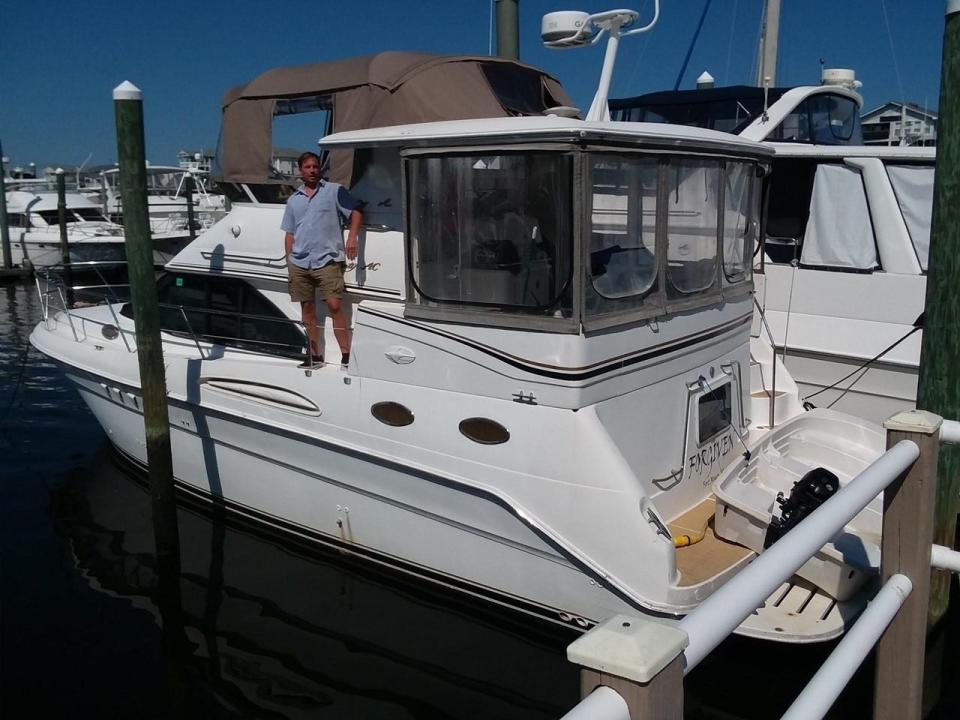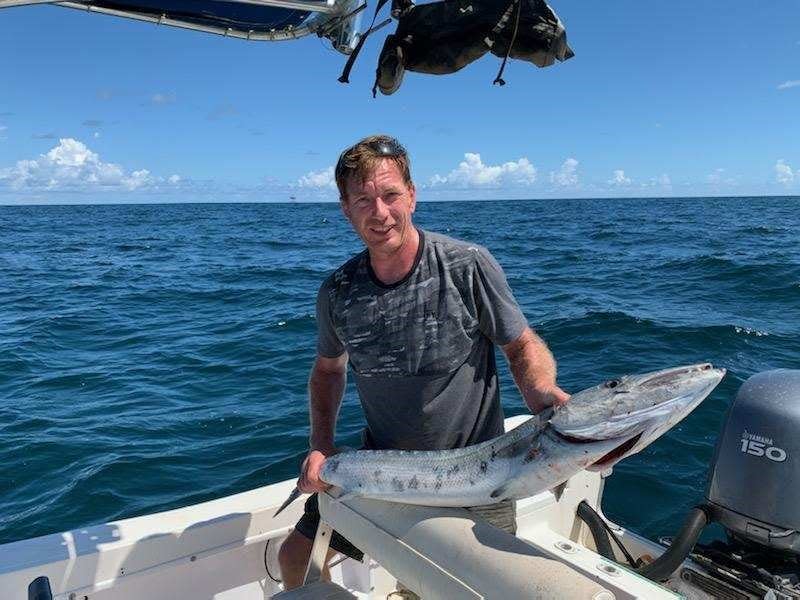How did a boat belonging to a missing Carolina Beach man cross the Atlantic Ocean?
Coated in a thick layer of barnacles and algae, the boat belonging to a missing Carolina Beach resident washed ashore last week after a seven-month journey across thousands of miles of Atlantic Ocean water.
Joseph Johnson, 44, was not aboard the capsized vessel. Johnson left on a solo fishing trip on Nov. 22, 2021, and never returned home.
His mother, Mary Kay Anderson, thinks he set off for his regular fishing spot — Frying Pan Shoals near Bald Head Island — when his engine failed and he was left to float. Anderson said the radio on Johnson's boat did not work.

The boat was discovered nearly 3,000 miles away last week when it hit land at São Jorge Island in the Azores archipelago near Portugal. Here's how his boat could have ended up across the Atlantic.
The latest: 'We know he's alive': Mother of missing Carolina Beach boater hopeful 7 months later
Previous coverage: Boat of missing Carolina Beach man washes ashore near Portugal
Riding surface currents across the Atlantic
Fredrick Bingham, professor of physics and oceanography at the University of North Carolina Wilmington, said he found it "totally plausible" that Johnson's boat would end up displaced on the small São Jorge Island in the Azores.
"It had to end up somewhere," he said. "Where the boat was found totally makes sense to me."
In the 211 days the boat was at sea, it traveled the roughly 2,758 miles from Carolina Beach to São Jorge. That's approximately 13 miles per day, which means the boat, on average, traveled at a speed of half a mile an hour — "like a really slow walk," Bingham said.
If the theory that Johnson's engine failed off the coast of Bald Head Island is correct, the boat would have begun floating, completely victim to the will of the surface currents. Bingham said the boat likely took a path where the currents moved at 0.2 meters, or about 25 centimeters, per second.
It's likely, Bingham said, the boat got caught in the Gulf Stream and traveled north past Cape Hatteras. During that time of year, Bingham said, the surface currents in the Gulf Stream would have moved at one to two meters per second — four to five times the average speed the boat moved at on the journey.
Bingham theorized that the Gulf Stream carried the boat past the Grand Banks (just southeast of Newfoundland Island, Canada) before it fell off to the south into slower waters.
"Once you get out of the Gulf Stream, you're moving really slowly in this part of the world," Bingham said.
Looking at the surface currents in that part of the Atlantic, Bingham said the boat likely approached the Azores island on the northeast side.
The Atlantic Ocean near the Azores, Bingham said, tends to be quiescent, almost dormant. The winds are light, the waves are small, the water is deep blue and the skies are clear.
"That's the type of ocean the boat would have been floating in once it left the Gulf Stream," he said.
These conditions wouldn't have been strong enough to capsize the boat, Bingham said. Instead, the boat likely capsized in the Gulf Stream, where waves would have been larger and currents stronger.
According to Carolina Beach police, Johnson was last seen on video surveillance footage leaving Federal Point Yacht Club — where he resided — on his 2006 Clearwater fishing boat. Police estimated the boat was 21 feet long.
"Once the boat loses control and it gets into seas like that, I can understand why it would just flip right over," Bingham said.
What storms formed in the Atlantic over the past seven months?
The National Hurricane Center in Miami, Florida, tracks tropical weather across the Atlantic, Central Pacific and Eastern Pacific oceans during hurricane season. According to archived data from the NHC, no tropical storms formed during the week of Nov. 22 — the day Johnson was last seen.
Related: Timeline from last sighting of missing Carolina Beach man to boat recovery near Portugal
Earlier: ‘Every day counts’: Family of missing Carolina Beach boater hopeful he’ll be found alive
The center pauses its regularly scheduled tropical weather outlook updates from Dec. 1 to May 14 but says updates will be issued if conditions warrant. No storms were reported during those months, according to archived reports.
Early June brought the first named tropical storm of the 2022 Atlantic hurricane season.
Tropical Storm Alex intensified in the Southwest Atlantic and brought heavy rain and 70 mph winds in the Southwest Atlantic. The storm ultimately caused flash flooding in Western Cuba and South Florida,
On June 6, the storm was located over warm Atlantic waters 200 miles west of Bermuda. Bermuda suffered rain and strong winds before the storm subsided.
In mid-June, the NHC reported thunderstorms in the Southwest Caribbean Sea, but no other significant storms have been reported this year.
Search continues
Johnson's boat was located and identified last week, and officials said the search for the man continues — now internationally.

According to Sgt. Colby Edens with the Carolina Beach Police Department, Portuguese authorities are working with local law enforcement to continue gathering evidence from the boat and attempt to locate Johnson.
Interpol, the powerful network of global police officers, is also alerting authorities internationally to be on the lookout for Johnson, Edens said.
The Carolina Beach Police Department described Johnson as a 6-foot-2, 220-pound white male with strawberry blonde hair. Anyone with information regarding Johnson’s whereabouts is asked to contact 911 or the department directly at 910-458-2540.
Jamey Cross is the public safety reporter at the StarNews. Reach her at jbcross@gannett.com or message her on Twitter @jameybcross.
This article originally appeared on Wilmington StarNews: Carolina Beach boat likely traveled through Gulf Stream on path to Azores
